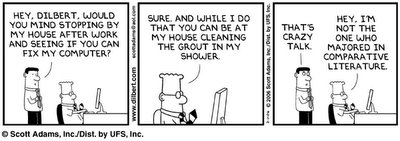Next week I'll be going to Tampa SBS UG to present on Linux in small business and I had a little chat on the local Linux User Group mailing list where they basically didn't understand either why I looked at Linux in the first place or why I was not promoting it on the desktop. One of the guys actually remarked how it would be "not too expensive" to offer Linux, which is pretty ridiculous when you consider the costs that come from supporting another platform. Either way, here was my response:
We're really not in the workstation business. We deal with the infrastructure, security, business intelligence. Where they get their boxes from is up to them, I prefer Windows on the desktop because it means its someone elses problem, not mine.
Support in small business is a big deal. Sometimes IT guys do not understand the computer experience of the office secretary, or the lack of time needed to "figure things out". There is no time to figure things out, it should just work. Here is another opinion on that end from Derek Konigsberg:
You just stated exactly why I don't try to push Linux on non-technical family/friends. If they run Windows, I don't have to support it. They can either "figure it out themselves" or bug just about any friend/family/tech-support-person when they have problems. The last thing I want is to be on-the-hook to provide technical support to anyone. (Sure, I'll help out friends/family when I'm there and available, but I don't want to take flak or have to go out of my way when things happen and I'm not around.)
Thats pretty much the state of desktop Linux today. Derek goes on into more detail about this problem:
This is a subject I often think about, and often see things that reinforce what I've come to believe. While real computer users exist across a wide spectrum of skill levels, it seems like the Linux community is focusing on essentially two types of users. For the sake of this post, I'll call them "geek" and "grandma". "geek" This category includes most of us here, who have the motivation and thought processes to be able to figure out almost anything in the computer user experience. Windows never really seemed hard to us, and neither did Linux (once we figured it out). But the key here is that we have the ability to figure out these things. Regardless of what our distro of choice happens to be, if push came to shove, we would be able to figure out any *nix, regardless of how much or little they cared about "ease of use". "grandma" This category of users pretty much get a machine (or have one setup for them by a "geek"), and don't mess with it. They run whatever software was installed for them, and use whatever hardware was configured for them. Even Windows is hard, and they usually never gain a comfortable familiarity with the OS beyond basic use of the applications at-hand. Typically these people are targeted by the "geek" for a "let's make it easy, and just work" distro like Knoppix or Ubuntu or heck even RedHat/Mandrake. As long as you include a bunch of usable apps that are pre-configured, everything is good. They're not going to go installing additional software or hardware by themselves. Does anyone see the problem here? I essentially just identified two ends of a bell curve. What about everyone in the middle? You know, people who buy software and hardware at the store, are capable of clicking their way through an application or device driver installer, and can successfully poke at the Windows control panel GUIs until their system works. What exactly are we doing to target this user base? Giving them a "geek" oriented distro won't work, since they'll never figure it out and go back to Windows. Giving them a "grandma" oriented distro won't work, since it'll break the moment they try to do anything outside the bounds of the environment they're given (or if the distro didn't just-work on installation, and a "geek" wasn't around to fix it for them), they're lost, so they go back to Windows. The interesting thing about MacOS, as a side-note, is how Apple built an OS for "grandma" and "geek". However, while the middle-user may find the OS more usable than Linux, they still feel frustrated. The GUI environment handicaps a lot of configurability, and the command-line environment is beyond them. So what exactly are we doing to target the large majority of users who range from "more capable than grandma" to "less capable than geek" who seem to be falling through the cracks?
That is your reality check right there. Most of business users fall in the middle of that bell curve where experience is low, training is insufficient and time = money. Consider the cost of training your office on Linux and compare that with a cost of Windows XP Pro. This is the type of a thing that leads to a quick outright rejection of Linux on the desktop. Now, when you look at Linux on the server (anotherwords: box nobody will ever have to touch) and you don't have to deal with CALs… Linux becomes a lot more interesting to a lot of people. That is why it is so successful on the server and not on the desktop.  Funny cartoon to illustrate the issue of IT support in small business. Only one complaint, I thought Chris wore glasses? 😉
Funny cartoon to illustrate the issue of IT support in small business. Only one complaint, I thought Chris wore glasses? 😉


 For the less coherent, more grammatically correct realtime insight, follow me on Twitter at
For the less coherent, more grammatically correct realtime insight, follow me on Twitter at
7 Responses to Why Desktop Linux Isn’t